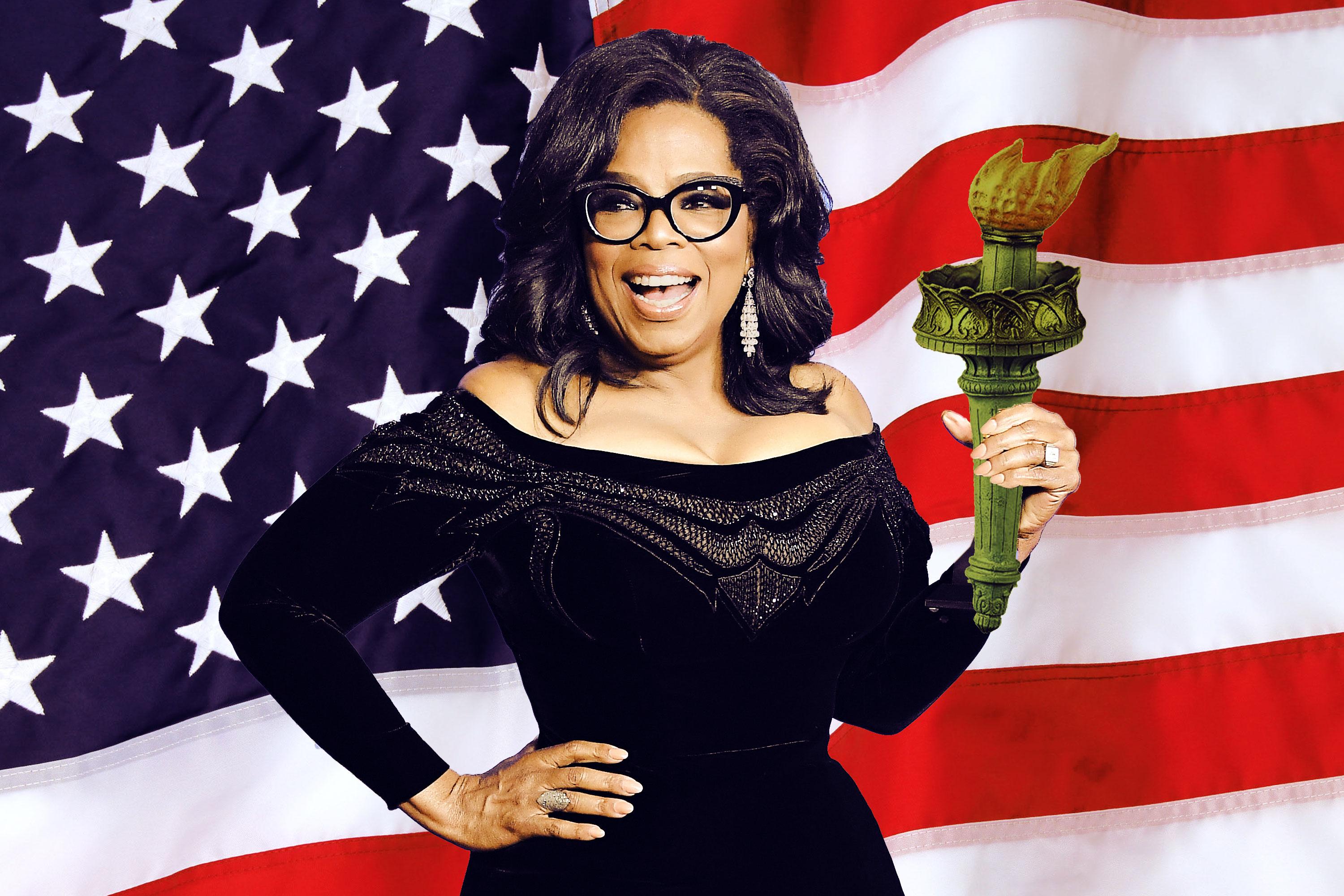
Here is the thing about wanting a celebrity to run for political office: You shouldn’t. But maybe you do.
On Sunday night, Oprah Winfrey accepted the Cecil B. DeMille lifetime achievement award at the Golden Globes. Her speech, delivered with her trademark precision as she stood dressed in black and held her trophy, has gotten a great deal more attention than any of the actual awards, and rightfully so. If you missed it, plop yourself down somewhere comfortable and secluded, where you can maybe get a little misty-eyed.
It does not sound like an actress’s speech, or a daytime-talk-show host’s speech, or a magazine mogul’s speech. It sounds like a politician’s speech, with all the talk of dreams and brighter futures, its dual crescendos at Winfrey’s proclamations that the time of powerful men lording over women is up and that a new and better day is on the horizon. And maybe, as you listened to this, you found yourself nodding along to the swells and feeling that Oprah had found a way to distill a dark past and present into hopeful marching orders, and maybe suddenly you were thinking, Hey, wouldn’t this be nice.
People have been joking, or kind of joking, or maybe not joking about a Winfrey presidency for years. Now, in the face of the “enormously consensual presidency” of Donald Trump — a man who is many things, but whose most salient feature en route to the White House was his celebrity — the calls have returned, louder and more sincere than in the past. On Sunday night, it was Golden Globes host Seth Meyers who made a not-quite-joke about reverse-jinxing Oprah into a 2020 run. “Oprah, you will never be president,” Meyers deadpanned as the erstwhile daytime host laughed along in the crowd. “You do not have what it takes.”
And then she got up and gave her speech, offering some much needed clarity, force, and moral certitude on a night otherwise filled with uneven, half-baked attempts at activism and allyship. Was this her 2004 Democratic National Convention speech? Could she save us from whatever it is that’s happening right now? Wouldn’t we be right to trust in Oprah, that long-glowing beacon of righteousness and good will? Wasn’t it just fanciful enough to be plausible? We the people certainly seemed ready to believe: Shares in Oprah-sanctioned Weight Watchers shot up; Infowars fired an Infowars-y warning shot.
But the other questions come nagging. What exactly is her relevant experience? What good is Meryl Streep’s endorsement when it comes to the less cheerful elements of a modern presidency, the setting of refugee caps or the signing off on drone strikes? Haven’t we learned our lesson about celebrities and politics? What reason do we have to think this would work? In the space of a few hours on Monday, The Washington Post ran a series of columns headlined, sequentially: “Oprah Winfrey’s presidential candidate-esque Golden Globes speech, annotated,” “Oprah Winfrey gives a master class for 2020 candidates,” “Oprah for president in 2020? Here’s everything you need to know,” and “Get a grip, people. Oprah should not run for president.”
What does Oprah Winfrey believe? We don’t know, at least not in any way that tells us what she would look like at the helm of the executive branch. She is yea on social services and nay on the 2003 invasion of Iraq; she has raised a great deal of money for Democrats. But her skill set, diverse as her decades of triumphant ranging around Hollywood and the media is, is decidedly apolitical, so much so that her tepid suggestion days after Trump’s victory that his presidency might not be the end of the world drew outrage.
There’s also the small matter of her wanting to do it. She has long denied any political aspirations, including in June, when she told The Hollywood Reporter, “I will never run for public office. That’s a pretty definitive thing.” Yet she endorsed Barack Obama and she, too, found herself moved by a speech: “I’ve never experienced anything like that,” she said after attending his nomination acceptance speech at the 2008 Democratic National Convention. “I cried my eyelashes off.”
There is liking Oprah, and then there is thinking that she’s our only hope. And that may be what it comes down to — for voters, or for would-be voters, or maybe even for her; “It’s up to the people,” her longtime partner Stedman Graham told a Los Angeles Times reporter Sunday night. “She would absolutely do it.” And who on the left could beat Donald Trump? Joe Biden, who would be 78 years old on inauguration day in 2021 and has been trounced in every one of his previous presidential attempts? Bernie Sanders, who is a year older than Biden? Kirsten Gillibrand? Cory Booker? Elizabeth Warren? Andrew Cuomo? John Hickenlooper? Kamala Harris? Tim Ryan? All established politicians, they have varying notoriety, records, and means. But they mostly share a kind of uncertainty with the 2020 odds, a rerolling of 2016’s uneven dice. We’ve seen this one before.
So then there’s Oprah, whose most well-defined characteristics are that she is nice and she is famous. She is also cartoonishly wealthy, a self-made billionaire an order or two beyond Trump. She is charismatic; she is understanding. She is a black woman. She would listen to your problems, the decades of Oprah-isms and Oprah-steered properties seem to say in unison, and then she would try to fix them. She seems like someone aware of her own limitations, and willing, perhaps, to hire accordingly.
Maybe the unknown is better than a grim known, or maybe our celebrities are better left in the bright lights of other stages, where they can pick their shots and stay out of the rest. Choosing another celebrity in 2020 is its own kind of cynicism, a vote of no confidence in one of the basic functions of our democracy. If your best defense of Oprah, apart from her being nice, is that she isn’t the other guy, then you’ve already given up. And that might be as anti-Oprah a position as there has ever been.

